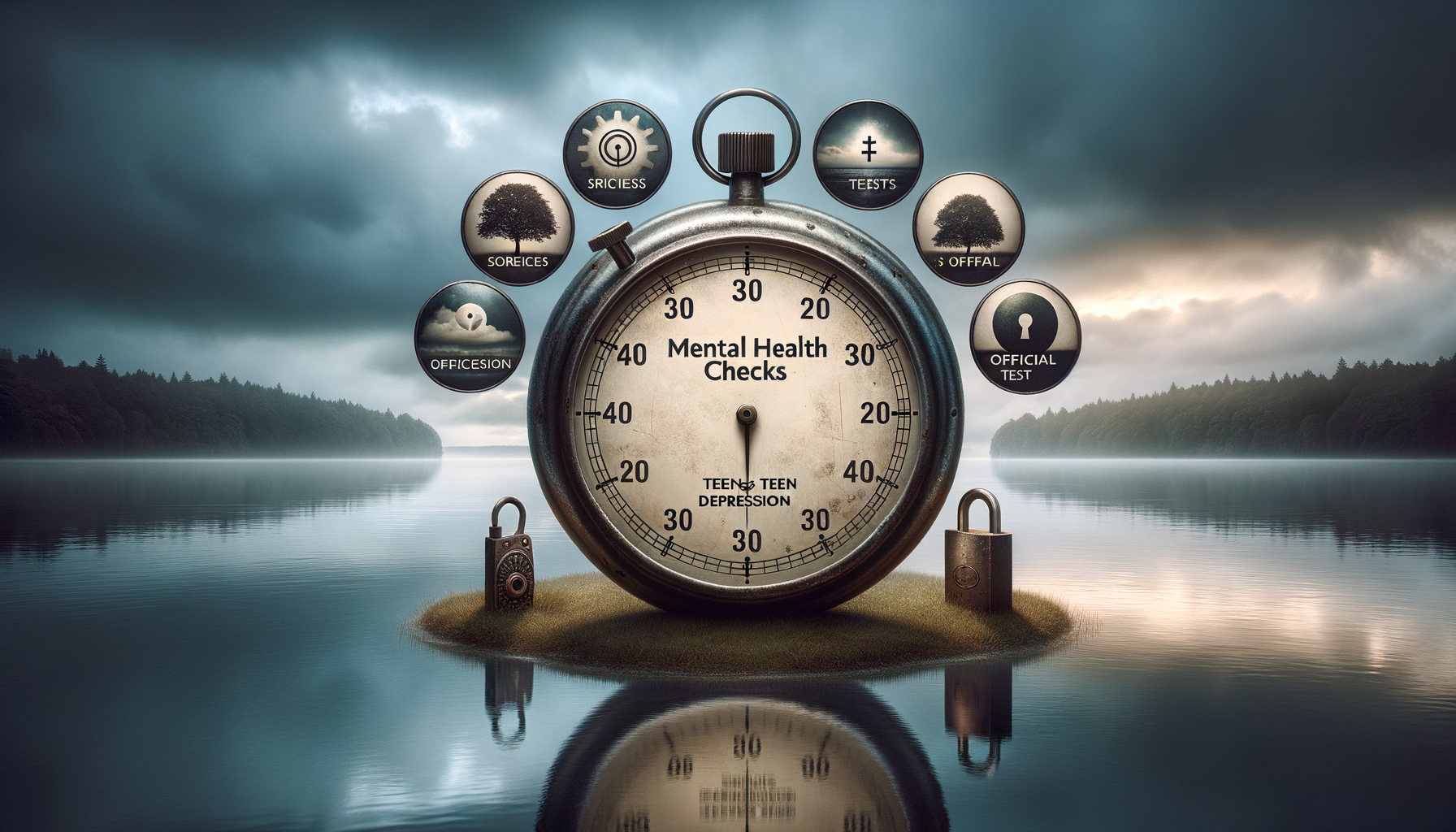Understanding Depression Tests for Teens
Adolescence is a tumultuous period marked by rapid changes and emotional upheavals. During this time, it’s not uncommon for teenagers to experience feelings of sadness or anxiety. However, when these feelings persist, it may be indicative of depression. Depression tests for teens are tools designed to help identify symptoms of depression early. These tests are typically structured as questionnaires that assess various aspects of a teen’s emotional and behavioral state. They aim to provide a snapshot of the teen’s mental health, offering insights that can guide further evaluation by a mental health professional.
It’s important to note that these tests are not diagnostic tools but rather screening instruments. They often include questions about mood, sleep patterns, appetite, and energy levels. By answering these questions honestly, teens can gain a better understanding of their mental health status. This can be a crucial step in seeking timely support and intervention. Parents and guardians should be supportive and encourage open communication, ensuring that teens feel comfortable discussing their feelings and concerns.
Moreover, schools and community organizations can play a significant role in promoting mental health awareness. By providing resources and education on depression, they can help destigmatize mental health issues and encourage teens to seek help when needed. The goal is to create an environment where teens feel safe to express their emotions and seek the support they need.
The Role of Official Depression Tests
Official depression tests are standardized tools used by healthcare professionals to assess the presence and severity of depression. These tests are based on established diagnostic criteria and are designed to provide a comprehensive evaluation of an individual’s mental health. One widely used test is the Patient Health Questionnaire (PHQ-9), which evaluates symptoms such as lack of interest in activities, changes in sleep, and feelings of hopelessness.
Official depression tests are beneficial in clinical settings as they provide a structured approach to assessing mental health. They offer a reliable means of identifying individuals who may need further evaluation or treatment. The results of these tests can guide healthcare providers in developing tailored treatment plans that address the specific needs of the patient.
It’s crucial for individuals to understand that these tests are part of a broader diagnostic process. A healthcare professional will consider the test results alongside other factors such as medical history, lifestyle, and personal circumstances before making a diagnosis. This comprehensive approach ensures that individuals receive the most appropriate care and support for their mental health needs.
For those experiencing symptoms of depression, taking an official test can be a valuable step toward understanding their condition. It can also provide a sense of validation and encourage individuals to seek professional help, knowing that their experiences are being acknowledged and taken seriously.
Exploring Quick Depression Tests
In today’s fast-paced world, quick depression tests have gained popularity due to their convenience and accessibility. These tests are typically available online and consist of a series of brief questions that can be completed in just a few minutes. While they are not as comprehensive as official tests, they serve as a preliminary screening tool for individuals who may be experiencing symptoms of depression.
Quick depression tests are particularly useful for individuals who are hesitant to seek professional help or are unsure about the state of their mental health. By providing immediate feedback, these tests can help individuals identify potential signs of depression and encourage them to seek further evaluation if needed.
However, it’s important to approach quick depression tests with caution. They are not a substitute for professional diagnosis and treatment. The results should be considered as an initial step in understanding one’s mental health, rather than a definitive assessment. Individuals are encouraged to follow up with a healthcare professional for a more thorough evaluation and to discuss any concerns they may have.
Despite their limitations, quick depression tests can be a valuable tool in raising awareness about mental health and encouraging individuals to take proactive steps in managing their well-being. By making mental health resources more accessible, these tests contribute to a broader effort to promote mental health awareness and support.
Comparing Different Types of Depression Tests
When it comes to assessing mental health, there are various types of depression tests available, each with its own strengths and limitations. Understanding the differences between these tests can help individuals choose the most appropriate option for their needs.
Depression tests for teens are specifically designed to address the unique challenges faced by adolescents. They focus on developmental and social factors that may contribute to depression, providing insights that are relevant to this age group. These tests often involve input from parents or guardians to provide a more comprehensive perspective.
Official depression tests, on the other hand, are standardized tools used by healthcare professionals. They offer a detailed evaluation based on established diagnostic criteria and are considered reliable for clinical assessment. These tests are typically more comprehensive and require interpretation by a trained professional.
Quick depression tests are accessible and convenient, offering a preliminary screening for individuals who may be experiencing symptoms of depression. While they provide immediate feedback, they are not as thorough as official tests and should be followed up with professional evaluation.
In summary, each type of depression test serves a specific purpose and can be beneficial in different contexts. Individuals are encouraged to consider their unique circumstances and consult with a healthcare professional to determine the most suitable approach for assessing their mental health.
Conclusion: Taking the First Step Toward Mental Well-being
Depression tests, whether designed for teens, official, or quick, play a crucial role in mental health awareness and support. They offer a starting point for individuals to reflect on their emotional well-being and seek further evaluation if needed. By understanding the purpose and limitations of these tests, individuals can make informed decisions about their mental health care.
It’s essential to approach these tests as part of a broader effort to promote mental health awareness and reduce stigma. Open communication, education, and support are key components in creating an environment where individuals feel empowered to seek help and take proactive steps toward their well-being.
For anyone experiencing symptoms of depression, taking a test can be a valuable first step. However, it’s important to remember that these tests are not a substitute for professional diagnosis and treatment. Seeking the guidance of a healthcare professional is crucial in obtaining a comprehensive evaluation and developing an effective treatment plan.
Ultimately, the goal is to foster a society where mental health is prioritized, and individuals have access to the resources and support they need to lead fulfilling lives. By taking the first step with a depression test, individuals can gain insights into their mental health and embark on a journey toward healing and well-being.



Leave a Reply